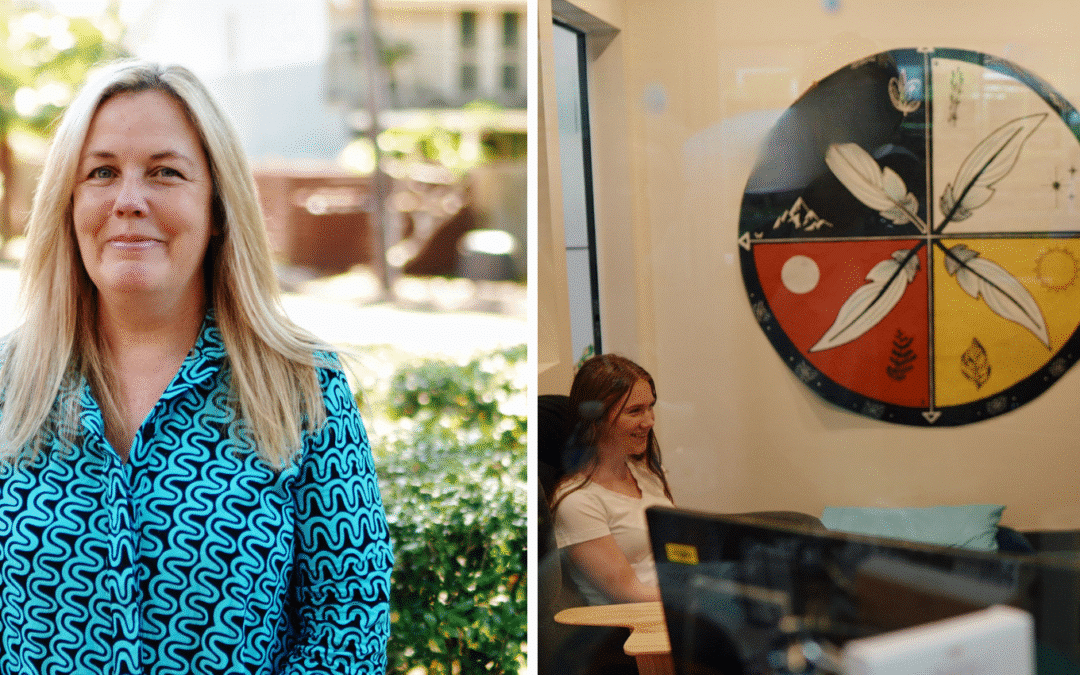Every September, R U OK? Day reminds Australians to talk about mental health and wellbeing. As the official R U OK? website says, starting one of these conversations can change a life – and it’s something we should aim to do all year round.
But asking “R U OK?” is only the first step in supporting someone in need.
Sally Roseby, Youth Off The Streets’ School Psychologist and Clinical Psychology Registrar, shares her advice on reaching out to others in a sensitive, affirming way – and how to follow up with them afterwards.
How can we support our friends, colleagues and loved ones on R U OK? Day in a genuine, respectful way?
Genuineness comes from engaging in meaningful conversations and then continuing to check in outside of R U OK? Day.
Days like this help to break the stigma of addressing and talking about our mental health, and often the best people to spot the signs that someone is struggling are those closest to them.
Use the day to check in with others, check in with yourself, and even set a reminder to continue checking in throughout the following months.
If we ask someone whether they’re okay and they say ‘no’, how should we respond in the moment?
Often, we feel like we need to ‘do something’ when someone tells us that they aren’t okay. However, one of the best responses can be to listen and validate what they are feeling.
What are some things you could say to someone who says they’re not okay?
When talking with someone about their struggles, it’s important to be open and non-judgmental. You want to validate their experience and take what they are saying seriously.
As psychologists, we often try to ask open-ended questions like “How are you feeling about that?” or “How long have you been feeling this way?”
We don’t need to fill the silence; we can just sit with them if they need time to think.
We can also encourage action, when appropriate, by asking how we can support them.
What are some things that you should avoid saying?
We all mean well when talking with our friends and family, but we can sometimes be quite invalidating in our responses. Sometimes we might say things like “that’s ridiculous,” or, “Why would you feel that way?”, which aren’t helpful in the moment.
We can sometimes also try to jump straight to the positive. This can also be insensitive, as we’re not giving time and space for the genuine concerns being expressed by the person.
What sort of help should you offer someone who says they’re not okay?
We can encourage action. This could be done by exploring ways they might have managed similar difficulties in the past, offering support or encouraging them to get in contact with professionals.
A positive attitude towards accessing appropriate mental health support may help to alleviate any stigma that may still exist about using these services.
What are some services or resources that could help someone get started on their mental health journey?
The first port of call for mental health should always be our GP. They can assist us with obtaining evidence-based care and support through a Mental Health Care Plan and a referral to an appropriately qualified mental health professional.
There are several telephone and online services that exist for people experiencing distress, including Beyond Blue, Lifeline and Kids Helpline. If you’re concerned about yourself or someone you care about, you can also contact the Mental Health Line (1800 011 511 in NSW) for 24/7 advice, assessment and referral support.
Lastly, if you’re ever concerned for your own safety or for someone else’s, I encourage everyone to contact 000 and request an ambulance.
How should you follow up with the person in the days and weeks after they tell you they’re struggling with their mental health?
Firstly, set a reminder to follow up. Life can be busy and you want to ensure that you don’t forget this among everything else you’re juggling.
Depending on how much they’re struggling, you might follow up in a few days or a week or so. You can call, text or schedule a face-to-face catch up – whatever works!
You should also let them know you’ve been thinking about them and want to know how they are going. From there, you start the process again – listen, encourage action and check in again afterwards.
How can you look after yourself while you’re supporting the person in need?
The importance of this should not be understated. We need to always be looking after ourselves if we’re in a role where we support our children, parents, friends or relatives. As the saying goes, you can’t pour from an empty cup.
We can look after ourselves by exercising and getting out into nature; taking a few deep breaths several times throughout the day; ensuring we’re scheduling time for things we enjoy or spending a mindful moment drinking our coffee.
Taking time to look after ourselves isn’t selfish; it’s a priority.
How can we expect the person we’re supporting to take steps toward action if we ourselves are not modelling this same behaviour?
Is there anything else we should know to talk about mental health?
It’s so important to make sure we’re in the right head space to ask the question “R U OK?”.
If we cannot give the person the appropriate space, time and validation, maybe we should pass our concerns to someone who can. We’ve still done our part in encouraging meaningful conversations about mental health and a culture of checking in with those around us.
To learn more about mental health support services at Youth Off The Streets, click here.



